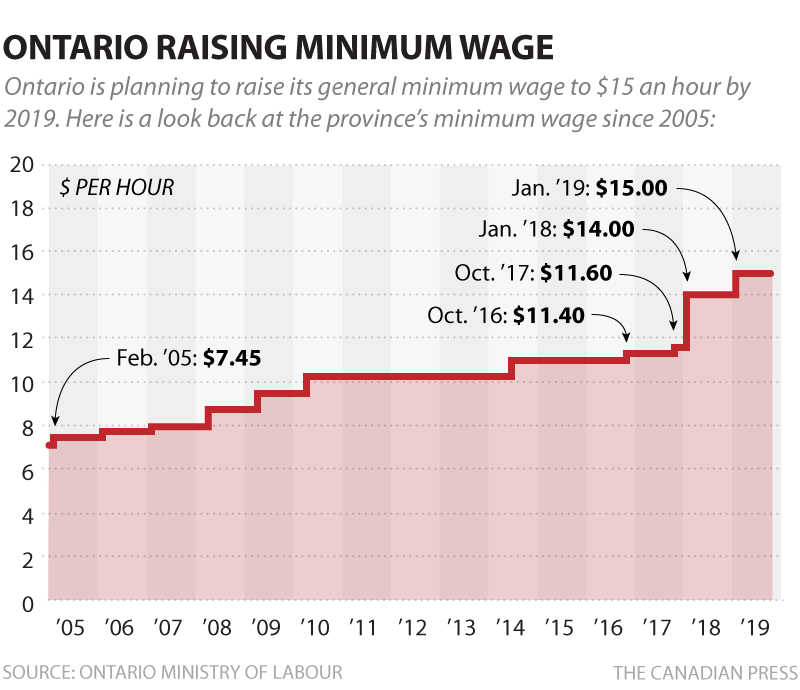 By Pepper Parr
By Pepper Parr
November 6th, 2018
BURLINGTON, ON
For the 60% of the people in Burlington who didn’t vote – a message. Elections matter!
For the 60% that didn’t vote in the provincial election – a message. Elections matter!
What difference would it have made to me some will ask?
For those people who have to work at the minimum wage level here is how it matters.

The Liberal government that was in office (By the way they deserved to lose) had a program that increased that minimum wage to $14 an hour last January and had planned on an increase to $15 an hour this January.
The government you elected four months ago cancelled that program.
Assume that the person being paid the minimum wage was working 35 hours a week and assume that they worked for 50 weeks in the year they would have received $1750 more in 2019.
That’s not an in-substantial amount for people who earn a minimum wage.
When Doug Ford was running for Premier of the province he didn’t tell anyone he planned on scaling back that planned increase. We suspect that very few minimum wage people thought anything about it.
The point is – who governs us as a society matters.
Parents might want to mention that to the children that are still living at home because they can’t afford to rent a place they can afford. For many of them they will never be able to buy a home.
Things were different for their grandparents – they probably voted.
The drive in the United States today will be to get people out to vote in what is going to be one of the most important elections to take place in the United States in decades.
What does that mean for Canada, Ontario or Burlington? We won’t know until the election results are in. If nothing changes – you can be assured of one thing – none of it will be good for us.
Elections matter!
How we got to this point as a society is troubling – the answer to that question is you just didn’t give a damn.
 Salt with Pepper are the opinions, reflections, observations and musings of the publisher of the Gazette, an on-line newspaper that is in its 8th year of as a news source in Burlington and is a member of the National Newsmedia Council.
Salt with Pepper are the opinions, reflections, observations and musings of the publisher of the Gazette, an on-line newspaper that is in its 8th year of as a news source in Burlington and is a member of the National Newsmedia Council.





















Actually, Doug Ford did announce prior to the June election that he would freeze the minimum wage at $14/hr and cancel the $1 increase in 2019, in exchange for ensuring minimum wage earners would pay no provincial income tax (see April article: https://globalnews.ca/news/4149786/doug-ford-minimum-wage-plan-math/). It was questionable how much of a benefit that would really be.
Doesn’t change the point of your article though; in fact it enhances it — people were warned. It’s one of the many reasons I didn’t vote PC. There were definitely other cuts that weren’t announced during the campaign, but people who have a sense of the general Conservative/Republican ideology suspected those might be coming.
People need to pay attention to elections and the real issues that will affect their lives, and look past sensational election promises like ‘buck a beer’ and saving a few cents/L on gasoline, meant to buy votes from ‘the little guy’, (plus ‘getting rid of Wynne’ — she was already stepping down anyway). Elections matter.
Dave, you are right–elections do matter! A deficit of $15.6Billion matters, an almost tripling of the provincial debt matters, an inept, expensive, and wasteful electricity program matters, gridlock and overintensification matters, corruption matters. Yes, Dave, I too felt that the past election mattered and that’s why I didn’t vote Liberal or NDP.
1) Notice how the Liberals didn’t raise minimum wage much after 2010, choosing to save it all up for 2018.
2) Many folks on minimum wage don’t work a full 40 hour week – nor a 52-week year.
Some unfortunately are laid off when their colleague gets a raise.
And others like those Tim Hortons workers lost their benefits and paid breaks.
3) Parents might want to mention to their children that…. if they only aspire to be a minimum wage worker – they’re pretty well doomed anyway.
4) But whatever….. – your point is well taken >>> VOTE
StatCan has a whole study on the make up of minimum wage workers before the increase and after the increase. They examined the age groups and family types (single vs. dual income) as well to give a pretty interesting view of minimum wage earners in Canada.
Here is the study: https://www150.statcan.gc.ca/n1/pub/75-006-x/2018001/article/54974-eng.htm
Here’s one quote for you from the study: “First, while less than one-fifth of minimum wage workers under 25 work full time, the majority―roughly two-thirds―of other minimum wage employees work full time.” They’re also disproportionately likely to be women, which could potentially signal fewer employment opportunities for women in certain areas that pay more than minimum wage.
Frankly, I don’t think it’s that people only “aspire” to be a minimum wage worker. Recent employment conditions favoured heavily towards the employer, and precarious work has been on the rise in a lot of areas. (Law Commission of Ontario study: https://www.lco-cdo.org/en/our-current-projects/vulnerable-workers-and-precarious-work/ )
On an anecdotal level, I knew a number of people who had successfully completed teacher’s college but were unable to get regular contracts with school boards upon graduation and so they turned towards working retail for extended periods of time while waiting for employment to open up as a teacher. The study I’ve linked to also shows that a number of minimum wage workers have at least a bachelor’s degree too, so the previous “guarantees” that a post-secondary education could guarantee you better employment are not strictly true.
Times are changing. If minimum wage becomes a norm for many people, then minimum wage is not just part-time work for students anymore (as indicated by the StatCan study).
There are four aspects of the minimum wage debate that don’t draw the degree of attention they deserve.
The first, as Phillip has alluded to, the minimum wage debate has a compounding effect. Assume you have employees earning minimum wage (i.e. $11.40 an hour prior to it being raised), and you have more experienced employees earning $16 an hour. When the minimum wage goes to $14 an hour the differential between junior and senior reduced from $4.60 per hour to $2. To maintain the wage differential and employee morale the employer has to adjust wages of all other employees accordingly. If you have salary compression between your minimum and maximum wage rates it can have a significant effect depending on the size of your workforce.
The second is that adjustments in the minimum wage rate impact businesses differentially. An established employer like Canadian Tire, Home Depot, etc. can more easily absorb the increase than can a small independent or seasonal operation. Most companies paying minimum wages run on tight margins. Any increase in costs is passed on to consumers in the form of higher costs for products or services.
The third is that the adjustments are potentially inflationary. Prices have to adapt upwards so employers can recoup the additional expenses. Again, it isn’t the chain stores that feel the pinch, it is small independents and seasonal operations.
Finally, many people being paid minimum wages are students or casual workers. Many are employed in the fast food industry or retail. Waiters and waitresses receive gratuities which mollify the impact of a lower wage, along with other non-monetary benefits.
All that being said, where the Ford government went “off the rails” was their simultaneous, ill-timed and hasty scrapping of the guaranteed minimum wage program that was being piloted in Lindsay and Thunder Bay. That initiative, potentially, could have had a real impact upon reducing poverty levels and improving the livelihood of low wage earners. If low wage earners could keep more of their income, not have to pay income tax, and receive top ups to bring them to a minimum level, that would have had real material benefit. Guaranteed income programs have been tried previously in Manitoba and other places in Canada, and they work. The fact that the Ford government didn’t allow the program to run its course and evaluate its efficacy is profoundly disappointing.
Ultimately, I think it comes down to three things: 1) People feel that the government is okay and/or won’t change; 2) People don’t feel engaged in local/provincial/federal politics and don’t feel informed enough to vote; or 3) They don’t feel that their vote will have any impact.
I’m not justifying the beliefs, but I’ve heard them from all age ranges (20’s to 60’s). The problem as I see it right now is that the political landscape is (and perhaps always has been) preying on the uninformed and going for a gut reaction to issues. What I am curious to see though, is whether the increasing divisiveness in politics / political beliefs will result in higher voter turn out. We’ll likely see this in the USA, but at this point, Canada’s political divide is widening considerably too. Will that motivate the non-voters? Time will tell.
Perhaps if we returned civic studies to the school curriculum we might generate more interest in voting.
I operate a small seasonal business here in Burlington and have done for the past 39 years. I employed 5 people this past summer, down from 7 in 2017. I have never paid minimum wage for two reasons–it is inequitable and I hire better, more productive employees. This past year in lock-step with the rise in minimum wage, I raised my wage rates (still above minimum). BUT, here is the result–I have just finished my income statement for 2018 and find I was working for just over $11 per hour. And I suspect many “moms and pops” who enjoy the freedom of self-employment are no different. But apparently it’s OK if the government takes money out of our pockets, gives than money to others, and allows us to work below minimum????? And that is equitable? It always looks so easy on paper.
Hi Phillip,
Is there a chance that I could buy you a coffee and chat about this at some point? I’d really like to get a deeper understanding of your perspective and what ideas you might have on how we can make this work for everybody.
You can reach me at andrewdrummond4burlington@gmail.com though I’m out of the country for a few days as of tomorrow.
Andrew, there is little to discuss. The original Liberal policy of increasing minimum wage in lock-step with the CPI was a good one. Spending power of employees was maintained in real terms (most of these employees did not pay income tax) while–AND THIS IS THE IMPORTANT POINT–business was able to adjust both retail prices and the cost of operations in an orderly way without dislocations such as unemployment, inflationary price increases. However, the Liberals abandoned this policy in favour of political expediency. No business can adjust quickly to a 17% increase in what is, for many, its major cost–labour. I will analyze the situation over the winter but if I don’t see any possibility of an improvement, then I am fortunate that I can close–kiss 5 more jobs goodbye!